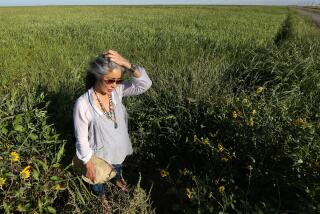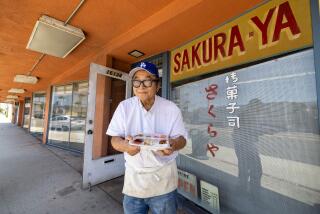YORBA LINDA : Mother Was Able to Rice to Occasion
- Share via
When B.J. Watanabe’s son was in first grade, some of his classmates teased him about the rice balls she packed in his lunch.
Instead of giving in to his request that she leave out the traditional Japanese snack, Watanabe went to her son’s class at Fairmont Elementary School to talk about her heritage and demonstrate how rice balls are made.
That impromptu presentation three years ago has grown into a weeklong multicultural event at the school, called “Celebrating Our American Heritage.”
This year, 13 mothers, including Watanabe, gave short presentations on their heritage and the contributions to the American lifestyle made by those cultures.
To demonstrate how American culture was shaped by its immigrants, displays from each of the featured cultures were arranged around a large table representing the United States.
At the beginning of the program, the American table contained a few items, but as each mother spoke about her heritage, she would contribute one or more additional items.
Holding up a videotape, Rhonda Cohen asked, “How many of you have seen ‘Jurassic Park’? It was produced by Steven Spielberg, a Jewish man who also produced ‘Jaws’ and ‘E.T.’ ”
Cohen added to the table a baseball signed by pitching great Sandy Koufax, a beaker labeled “polio vaccine” and representing Jonas Salk, and a handful of gold-colored medals signifying the achievement of Olympic swimmer Mark Spitz.
After mothers representing the Philippines, Colombia, China, Africa, Sweden and Korea finished speaking, the American culture table also contained a yo-yo, coffee beans, fireworks, a blues album, a zipper and a tae kwon do outfit.
Thursday’s presentation was the second one for Fairmont students. Earlier in the week, they heard about Native American, Italian, East Indian, British, Japanese and Mexican cultures.
“Our purpose is twofold,” Watanabe said. “We are trying to demonstrate what these cultures have contributed to our common American culture and we want to reinforce that it’s OK to be proud of your heritage.”
More to Read
Sign up for Essential California
The most important California stories and recommendations in your inbox every morning.
You may occasionally receive promotional content from the Los Angeles Times.













